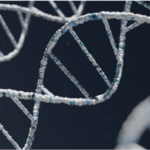Asthma is a lung inflammatory illness that affects the tiny airways. It’s marked by intermittent airway narrowing and airflow blockage, which causes wheezing and shortness of breath.
A combination of factors most likely causes asthma. Allergies are most commonly related to asthma in children and young adults, although asthma that develops later in life is less allergic and is more common in women and smokers.
Asthma can also develop in the workplace due to inhaled protein, such as baker’s flour, or certain chemicals like paint additives. The most frequent type of asthma is atopic asthma, primarily seen in the Western world. Asthma affects one out of seven children, totaling approximately 15 million people worldwide. A rural lifestyle is consistently linked to a low asthma prevalence. Farmers’ children benefit from exposure to farm animals, the consumption of unpasteurized milk, and the presence of a pet in the home and large family sizes.
Asthma affecting lungs
Role of Genetics in the development of asthma:
Asthma runs in families and is caused by genetic predisposition and environmental variables in equal measure. The substantial familial clustering of asthma has prompted a surge in research on the disease’s genetic propensity. Although all asthma genes have yet to be identified, genetic discoveries are transforming how we think about asthma pathogenesis.
Positional cloning systematically identifies disease genes that begin with discovering genetic areas linked to disease. It does not necessitate any assumptions regarding illness pathophysiology. ADAM33, PHF11, DPP10, GRPA, and SPINKS are the five asthma genes discovered by positional cloning. The roles of all of these genes are unknown, but their expression suggests that they deal with external threats or harm. Many of the genes discovered through candidate gene studies may also influence the cells that make up the mucosa, causing an immune system reaction.
Asthma Lungs.
The Role of Genetics in the management and prevention of asthma:
It is envisaged that genetic discoveries would lead to a better classification of complicated diseases like asthma and the development of novel medicines due to genetic findings. Most polymorphisms discovered so far do not appear to entail risks that would justify their use in illness classification, but combinations of genetic polymorphisms may be significantly more helpful. It is also believed that genetic discoveries would aid in identifying environmental factors that protect against asthma. The link between asthma and innate immune system receptors for microbial compounds is particularly intriguing in this context.
Potential asthma susceptibility genes must now be investigated in cases and controls with various illness presentations and severity and in representative population samples with various environmental risk factors to become relevant to clinical asthma. The magnitude relevance of impacts may then be measured objectively, and genotype will become a predictor of disease that can be described in the same terms as other epidemiological risk variables.
The Role of Genetics in the Treatment of Asthma:
So far, several asthma susceptibility genes have been identified as possible asthma therapeutic targets. However, determining whether any of these will be the basis for future treatments will take longer. Polymorphisms may also help determine how well an asthmatic will respond to treatment. To discover a link between common arginine-16 variations in the beta-adrenergic receptor gene and asthmatic patients’ agonist response.
Gene therapy effectively treats some single-gene illnesses, but it must be delivered according to strict therapeutic guidelines and is not without danger of significant adverse effects such as cancer. As a result, gene therapy for asthma or other associated conditions is unlikely to be used shortly.
Asthma patient.
Future Role of Genetics:
Gene therapy effectively treats some single-gene illnesses, but it must be delivered according to strict therapeutic guidelines and is not without danger of significant adverse effects such as cancer. As a result, gene therapy for asthma or other associated conditions is unlikely to be used soon.
The genetic propensity to asthma is most likely a result of an evolutionary adaptation to helminth infections. If this is the case, people who have had a high helminth load in the past may be genetically more prone to asthma as hygiene standards improve, and countries create expanding urban lifestyles. This indicates a significant potential public health issue, and research into the development of asthma during the transition from rural to urban lifestyles in emerging countries is desirable.
20/01/2022






